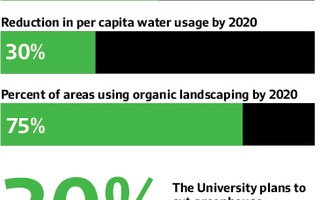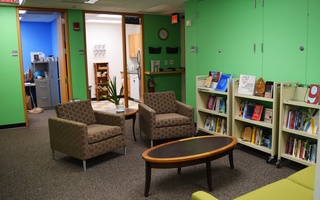Leaders of Harvard’s renewed “Living Laboratory” initiative, designed to engage students and faculty in sustainability efforts, say the program reflects growing interest in environmental action on campus.
The core idea of the Living Laboratory initiative, which will be housed in the Office for Sustainability, is to use the Harvard campus as a test bed for new ideas related to combating climate change and improving public health.{shortcode-159f82f311b0a3b0fbf0bcfa3557d6ff26fe0f5e}
While the original Living Laboratory initiative, which offers student grants, will remain in place, two additional projects have been announced as part of the revitalized program: the Climate Solutions Living Lab Course and Research Project, and a new $200,000 Campus Sustainability Innovation Fund.
According to Heather A. Henriksen, the director of the Office for Sustainability, the introduction of the new plan reflects a trend of increasing interest in sustainability among Harvard students.
“I've been here since 2008. In the last eight years I definitely have seen an increase in interest from students as well as faculty and senior administrators at the University to do more to translate our research into practical problem-solving,” she said.
The Climate Solutions Living Lab Course and Research Project, led by Law School clinical professor Wendy B. Jacobs, will launch in spring 2017. The interdisciplinary course will discuss various approaches to reducing greenhouse emissions at Harvard and beyond.
“The object of the course is for the students to do some real life problem solving about climate change,” Jacobs said.
Jacobs also talked about the importance of collaboration and a multidisciplinary approach in the course.
“The class is specifically designed to bring together faculty and students across campus,” she said.
The aim of the new Campus Sustainability Innovation Fund is to spur new sustainability research projects, and will be made available to undergraduate, graduate students, and post-doctoral students at the University.
The fund has already caught the attention of post-doctoral fellow Piers O. MacNaughton, who, after taking advantage of grant money from the Office of Sustainability in the past, has already applied for funding for some new research projects.
MacNaughton lauded the initiative as providing a new funding source for students.
“When I started at the masters program four years ago, they didn't have these types of grants for students,” he said. “Typically, you don't have the opportunity to pitch a project like we’ve been able to. That in and of itself is unique.”
Although not yet in full swing, Henriksen is optimistic about the Living Laboratory's new offerings.
“I am very hopeful that, driven by faculty and student interest, we will do more and more from Living Laboratories,” she said.
Read more in University News
CNN President Says Network Not Responsible for Trump's NominationRecommended Articles
-
 University Sets New Goals for Curbing Consumption, Waste
University Sets New Goals for Curbing Consumption, Waste -
Scientist Discusses Health, Campus SustainabilityArlene D. Blum discussed her work to reduce use of what she called harmful flame retardant chemicals in consumer products, which she praised Harvard for moving away from in recent years.
-
 Sustainability Office Relocates to Harvard Square
Sustainability Office Relocates to Harvard Square -
 Harvard Meets Goal of Reducing Emissions Since 2006
Harvard Meets Goal of Reducing Emissions Since 2006 -
 2017 Sustainability Report Highlights Progress, Features New Graphics
2017 Sustainability Report Highlights Progress, Features New Graphics













